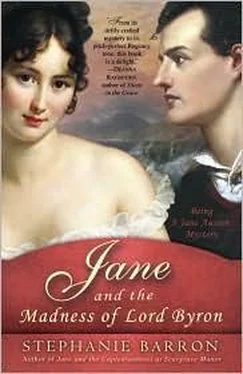“Did you happen to observe, sir,” I interjected, “how Lady Caroline came to make Miss Twining’s acquaintance?”
“Went bang up to her, barely a few moments later. That would be once Lady Caroline had crossed the entire ballroom to meet Lord Byron, who appears not to have valued the honour as he ought. He left the Assembly in considerable dudgeon not long thereafter. Miss Twining, however, appeared most gratified by her ladyship’s attention, and declined to dance again, tho’ Captain Viscount Morley attempted to lure her back to the floor for the waltz. I rather wondered the Silchester did not throw her charge in the Captain’s way—for he is a most charming young officer, and is Derwentwater’s heir, to boot. But perhaps she guessed he is addicted to gambling, like all the rest of the family, and did not like to put Miss Twining forward.”
Derwentwater . Where had I heard the title before? And not so long since? My thoughts raced backwards. Not at Mona’s, nor yet in Lady Oxford’s conversation; it was Mrs. Silchester herself who had uttered the name.
“Derwentwater?” I repeated. “Do I collect you to refer to the Earl?”
“Indeed. Grown sadly ramshackle since his wife’s death, and spends too much time hunting with the Quorn to keep his good looks; but a gentleman to the teeth. One wonders at him exposing his son to all the dangers of a cavalry regiment in the present age—he has only the one, and the Captain, they say, was very gallant at Talavera—but soldiering is a passion in the Barrett family, you know, and young Philip would not be denied his colours. Barrett, of course, is the Earl’s family name; Derwentwater being the Earl’s title, and Viscount Morley the Captain’s honourific, until such melancholy time as he is forced to sell out, and accede to his father’s duties.”
It was just such a fussy point of pedantry as a Master of Ceremonies might be expected to convey. Lady Swithin sighed impatiently beside me; but she could not know how Mr. Forth’s words had electrified me.
“Did you say … Philip?” I stammered. “Was there not … another Barrett of that name?”
The Master of Ceremonies’s rich murmur dropped even lower. “The Viscount’s uncle , I believe. Present Earl’s younger brother, killed in an affair of honour. Derwentwater never speaks of him, I understand.”
“Of course,” I murmured. Because the Earl’s brother had eloped with Catherine Twining’s mother.
Could it be possible the dashing young Captain had unknowingly courted the daughter of General Twining—whose pistols had put paid to his uncle’s life? Or, as seemed more probable, had he deliberately cultivated the connexion under the General’s very nose? And had the General observed it, and known the Captain for his persecutor? Was it for this reason—one he might hesitate to disclose to his daughter—he had quitted the Assembly early? But if fearful of the Captain’s knowledge and influence—why had General Twining not carried his daughter home with him? It was a decided puzzle.
And then a more sinister thought entered my head, conjured by Lady Oxford’s ominous phrase. A revenge tragedy . Good God—what if the Captain had merely bided his time, until the child of his family’s enemy had been alone and defenceless? What if he had followed Catherine from the Assembly that night, and awaited her release from the Pavilion, only to spirit her off to her watery death? He was, after all, a soldier—accustomed to killing through years of hard campaigning. Was that the same, however, as deliberately drowning a young girl?
And could he have known of the tunnel from the Pavilion?
Having known of it, and determining to use it, was but a simple step; to throw all suspicion on Lord Byron, whom the Captain apparently held cheap, should make a lark of murder.
“Jane,” Mona said to me, “are you quite well? You look faint.”
“It is nothing, I assure you. Merely that Mr. Forth’s descriptions—so exact in every detail—bring the whole of Monday evening before my mind; and I confess the impressions must make any friend of Miss Twining’s rather low. Do not regard it, I beg. Mr. Forth has been everything that is patient and kind, and has been wishing me at the far end of the earth this quarter-hour, I am sure. I shall not trespass longer upon your time, sir.”
“It was a pleasure, ma’am,” he said with regal condescension; and offered me a final bow.
Mona and I curtseyed; I observed a mamma and daughter hovering near the French doors in the hope of being noticed by the Master and put in the way of introductions for the dance; and made good my escape. I should dearly have loved to have heard Mr. Forth’s assessment of their dress, however—for his calculation of the cost of their trimmings should, I am sure, have been entirely exact.
Italian lace, twelve shillings the yard, purchased on the cheap at Pantheon Bazaar …
“If you should like a glimpse of the fascinating Captain,” Mona muttered in my ear, “I believe he is even now in the card room—playing at whist with Lord Byron.”
“Mona,” I said, “General Twining killed the Captain’s uncle in a duel.”
“I know,” she calmly replied. “I have been acquainted with Derwentwater from my cradle; he very nearly offered for me when his first wife, Lady Sarah as was, went off in childbirth—but I have never believed in second attachments. And a wise decision it was—the Master is correct in saying he hunts too much.”
“But were you at all acquainted with the younger brother?”
“Philip? Naturally. He was a rakehell if ever I knew one. But an elopement —I cannot think why he thought it necessary! Such affaires never end well.”
“But do you not think it exceedingly odd that his nephew should be dancing with General Twining’s daughter?”
“Well—she was excessively pretty,” Mona said blandly. “Recollect that I was present at the ball, Jane; I observed the Captain and Miss Twining dance; but I did not find anything particular to remark in it. Else I should have told you the whole.”
I could have shaken the Countess for her imperturbability. “Nothing particular —even when the Assembly was concluded with Catherine’s murder? And I suppose you see nothing untoward in the Captain’s playing at whist with a man he despises?”
She gazed at me, bewildered. “But men are always gambling with those they despise! It lends spice to the winnings!”
“Exactly,” I returned, in my driest manner. “Lead me to the Captain, Mona, if you please.”
Chapter 26 Damning Testimony
THURSDAY, 13 MAY 1813
BRIGHTON, CONT.
THE OVERWHELMING FIRST IMPRESSION OF CAPTAIN Viscount Morley was his remarkable beauty; the second, must be of his relative youth. The former I had expected; the latter took me by surprize.
He was a golden lad, with eyes of cornflower blue; a slim and sinewy figure, whose whipcord body suggested the hunting field—or the cavalry ring. The social excesses of the 10th Hussars were made much of, owing to their patronage by the Prince and the breathless breeding of their officers; but the 10th was also a disciplined, honed, and formidable fighting machine tempered by hard campaigning in the Peninsula—where this boy had conducted himself with “gallantry.” I knew full well what that meant—he had cut his way with a sabre, on horseback, through rank upon rank of the French; and he had come out unscathed at the other side. Seen from the rear in his regimentals, the Captain appeared compact, spare, and efficient—one glance at his face, however, which was suggestive of the angel, and any girl of fifteen should be lost.
Читать дальше












